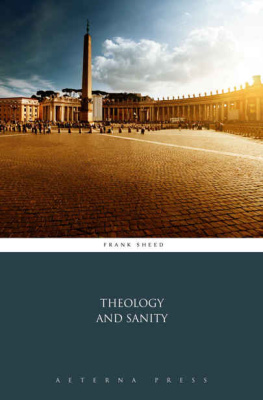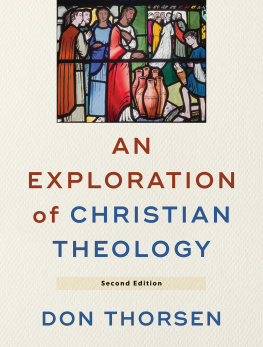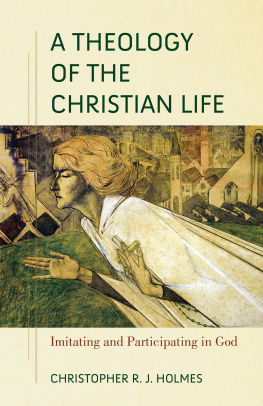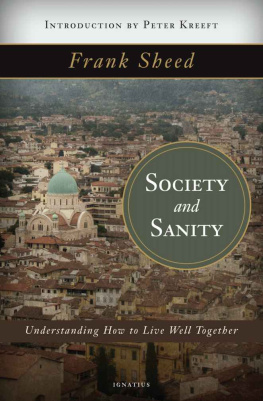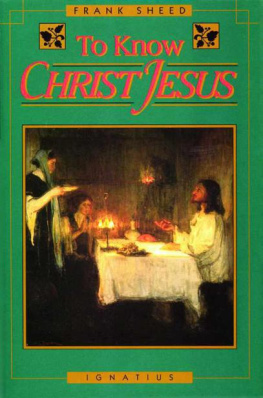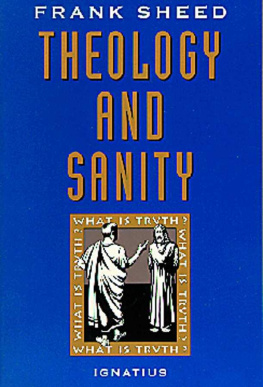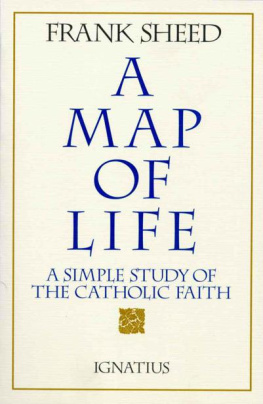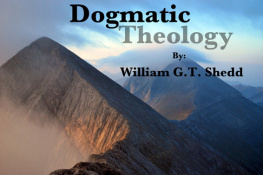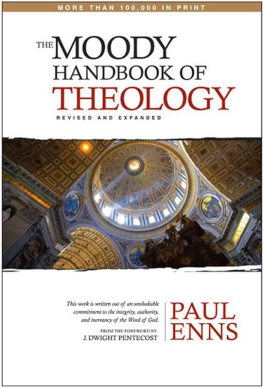Sheed - Theology and sanity
Here you can read online Sheed - Theology and sanity full text of the book (entire story) in english for free. Download pdf and epub, get meaning, cover and reviews about this ebook. year: 2014, publisher: Aeterna Press;Catholic Way Publishing, genre: Religion. Description of the work, (preface) as well as reviews are available. Best literature library LitArk.com created for fans of good reading and offers a wide selection of genres:
Romance novel
Science fiction
Adventure
Detective
Science
History
Home and family
Prose
Art
Politics
Computer
Non-fiction
Religion
Business
Children
Humor
Choose a favorite category and find really read worthwhile books. Enjoy immersion in the world of imagination, feel the emotions of the characters or learn something new for yourself, make an fascinating discovery.
- Book:Theology and sanity
- Author:
- Publisher:Aeterna Press;Catholic Way Publishing
- Genre:
- Year:2014
- Rating:5 / 5
- Favourites:Add to favourites
- Your mark:
- 100
- 1
- 2
- 3
- 4
- 5
Theology and sanity: summary, description and annotation
We offer to read an annotation, description, summary or preface (depends on what the author of the book "Theology and sanity" wrote himself). If you haven't found the necessary information about the book — write in the comments, we will try to find it.
Sheed: author's other books
Who wrote Theology and sanity? Find out the surname, the name of the author of the book and a list of all author's works by series.
Theology and sanity — read online for free the complete book (whole text) full work
Below is the text of the book, divided by pages. System saving the place of the last page read, allows you to conveniently read the book "Theology and sanity" online for free, without having to search again every time where you left off. Put a bookmark, and you can go to the page where you finished reading at any time.
Font size:
Interval:
Bookmark:
THEOLOGY
AND SANITY
FRANK SHEED
COPYRIGHT 201 BY AETERNA PRESS .
ALL RIGHTS RESERVED.
AVAILABLE IN PAPERBACK.
COPYRIGHT 1947 BY SHEED & WARD, NEW YORK, US.
QUOTATIONS FROM THE TRANSLATION OF THE NEW TESTAMENT BY MONSIGNOR RONALD KNOX ARE MADE BY COURTESY OF THE PUBLISHERS, MESSRS. BURNS, OATES AND WASHBOURNE, LTD.
I played with the thought of dedicating this book TO ALL WHO KNOW LESS THEOLOGY THAN I. It would have sounded flippant. But it would have been exact. There are thousands who know more theology than I, and for them I have no message: they must teach me. But there are thousands who know less, and less is not enough: I must try to teach them. This book contains theology, not the great mass of it that theologians need, but the indispensable minimum that every man needs in order that he may be living mentally in the REAL WORLDwhich is what the word SANITY means in my title.
Sanity, remember, does not mean living in the same world as everyone else; it means living in the real world. But some of the most important elements in the real world can be known only by the revelation of God, which it is theologys business to study. Lacking this knowledge, the mind must live a half-blind life, trying to cope with a reality most of which it does not know is there. This is a wretched state for an immortal spirit, and pretty certain to lead to disaster. There is a good deal of disaster around at this moment.
F. J. S.
RELIGION & THE MIND
MY concern in this book is not with the will but with the intellect, not with sanctity but with sanity. The difference is too often overlooked in the practice of religion. The soul has two faculties and they should be clearly distinguished. There is the will: its work is to loveand so to choose, to decide, to act. There is the intellect: its work is TO KNOW, TO UNDERSTAND, TO SEE: to see whatTO SEE WHATS THERE.
I have said that my concern is with the intellect rather than with the will: this not because the intellect matters more in religion than the will, but because it does matter and tends to be neglected, and the neglect is bad. I realize that salvation depends directly upon the will. We are saved or damned according to what we love. If we love God, we shall ultimately get God: we shall be saved. If we love self in preference to God then we shall get self apart from God: we shall be damned. But though in our relation to God the intellect does not matter as much as the will, (and indeed depends for its health upon the will) it does matter, and as I have said, it is too much neglectedto the great misfortune of the will, for we can never attain a maximum love of God with only a minimum knowledge of God.
For the souls full functioning, we need a Catholic intellect as well as a Catholic will. We have a Catholic will when we love God and obey God, love the Church and obey the Church. We have a Catholic intellect when we live consciously in the presence of the realities that God through His Church has revealed. A good working test of a Catholic will is that we should do what the Church says. But for a Catholic intellect, we must also see what the Church sees. This means that when we look out upon the universe we see the same universe that the Church sees; and the enormous advantage of this is that the universe the Church sees is the real universe, because She is the Church of God. Seeing what She sees means seeing what is there. And just as loving what is good is SANCTITY, or the health of the will, so seeing what is there is SANITY, or the health of the intellect.
Now in that sense most of us have Catholic wills, but not many of us have Catholic intellects. When we look at the universe, we see pretty well what other people see, plus certain extra features taught us by our religion. For the most part, the same influences that form other peoples minds, form oursthe same habits of thought, inclinations, bodily senses, indolences, worked upon by the same newspapers, periodicals, best-sellers, films, radio programmes. So that we have not so much Catholic minds as worldly minds with Catholic patches. Intellectually, we wear our Catholicism like a badge on the lapel of the same kind of suit that everyone else is wearing.
If that seems to you too sweeping, consider what the Church does see when She looks at the universe. For one thing, She sees all things whatsoever held in existence from moment to moment by nothing but the continuing will of God that they should not cease to be. When She sees anything at all, in the same act She sees God holding it in existence. Do we? It is not merely a matter of knowing that this is so. Do we actually see it so? If we do not, then we are not living mentally in the same world as the Church. What is more, we are not seeing things as they are, for that is how they are.
Let us look a little longer at this first fact about anything. I can recall with great clarity the moment when for the first time I heard myself saying that God had made me and all thingsof nothing. I had known it, like any other Catholic, from childhood; but I had never properly taken it in. I had said it a thousand times, but I had never heard what I was saying. In the sudden realization of this particular truth there is something quite peculiarly shattering. There are truths of religion immeasurably mightier in themselves, and the realization of any one of them might well make the heart miss a beat. But this one goes to the very essence of what we are, and goes there almost with the effect of annihilation. Indeed it is a kind of annihilation. God used no material in our making; we are made of nothing. At least self-sufficiency is annihilated, and all those customary ways that the illusion of self-sufficiency has made for us. The first effect of realizing that one is made of nothing is a kind of panic-stricken insecurity. One looks round for some more stable thing to clutch, and in this matter none of the beings of our experience are any more stable than we, for at the origin of them all is the same truth: all are made of nothing. But the panic and the insecurity are merely instinctive and transient. A mental habit has been annihilated, but at least the way towards a sounder mental habit is clear. For although we are made of nothing, we are made into something; and since WHAT WE ARE MADE OF does not account for us, we are forced to a more intense concentration upon THE GOD WE ARE MADE BY.
What follows is very simple but revolutionary. If a carpenter makes a chair, he can leave it and the chair will not cease to be. For the material he used in its making has a quality called rigidity, by virtue of which it will retain its nature as a chair. The maker of the chair has left it, but the chair can still rely for continuance in existence upon the material he used, the wood. Similarly if the Maker of the universe left it, the universe, too, would have to rely for continuance in existence upon the material He used? NOTHING. In short, the truth that God used no material in our making carries with it the not-sufficiently-realized truth that GOD CONTINUES TO HOLD US IN BEING, and that UNLESS HE DID SO WE SHOULD SIMPLY CEASE TO BE.
This is the truth about the universe as a whole and about every part of it. Material beingsthe human body, for instanceare made up of atoms, and these again of electrons and protons, and these again of who knows what; but whatever may be the ultimate constituents of matter, God made them of nothing, so that they and the beings so imposingly built up of them exist only because He keeps them in existence. Spiritual beingsthe human soul, for instancehave no constituent parts. Yet they do not escape this universal law. They are created by God of nothing and could not survive an instant without His conserving power. We are held above the surface of our native nothingness solely by Gods continuing Will to hold us so.
Font size:
Interval:
Bookmark:
Similar books «Theology and sanity»
Look at similar books to Theology and sanity. We have selected literature similar in name and meaning in the hope of providing readers with more options to find new, interesting, not yet read works.
Discussion, reviews of the book Theology and sanity and just readers' own opinions. Leave your comments, write what you think about the work, its meaning or the main characters. Specify what exactly you liked and what you didn't like, and why you think so.

